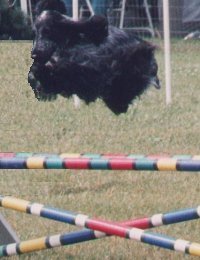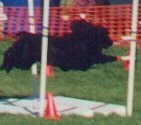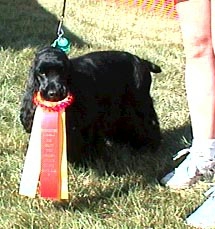|
|

|
| Agility is the most fun, wonderful,
and refreshing of
all dog sports. A place where both handler and dog must work
together and be ready for the unexpected.
Teamwork is the name of the game. I start my
English Cockers in agility training as puppies, taking care that
they do not jump "height", but just learn to go over the
bar at minimum height between the side panels, whatever they may
be. The tunnels are great fun...and the chute a joy for
these active and interested puppies. |

'Benny' - O'Crowley
|
|
Always use
positive reinforcement! Throw treats or roll a ball filled with
treats in front of you, so they learn to run ahead.
But never correct your English Cocker without a very quick
positive reward after the correction. |
|

'Barra' - O'Crowley
|
English Cockers think the teeter-totter is
a great thing to accomplish, as is the dog walk and the
ramp. They easily learn that the "bottom" is
where you want to stop to get treats and/or praise (and to make
sure you touch the contact zones). |
| Of all performance events, agility
is where competitors feel the greatest communication and sense of
"being one with your dog." It takes a strong
leader and yet a gentle teacher to train for this sport. |
| Your English cocker will need to be well
conditioned (as will the handler!), and you can feel the joy and
excitement as they wait for their turn on the starting line.
Not every dog and handler pair will be up to going all the
way to the top of agility titling, but all can enjoy Novice and
then decide if moving on to Open and Excellent (in AKC) is right
for them. |

'Barra' - O'Crowley
|
| Most starting dogs need a minimum of
obedience training. They need to look to you for direction,
they need a good "come" and can learn "stay"
and "down" and "sit" during the early classes
before competition.
The main thing is a love of working together and seeing it
as a partnership. An English Cocker is smart enough to know
when it can ignore your commands and get away with it, so never
let that happen, and if it tries, say "wrong" and give
it another command and be absolutely exuberant about it being
correct! Positive training will pay off in the long
run. You will have a happy and confident dog that will come
back after making an on course error and just happily move
on. You can ask for no more.
It is truly a partnership and one that is made with love and
hard work from both of you. |
|